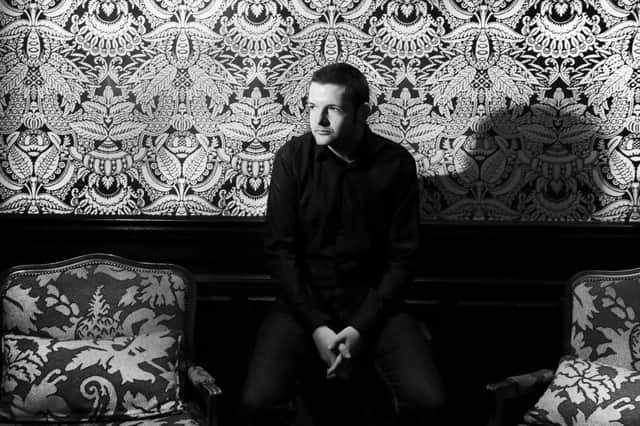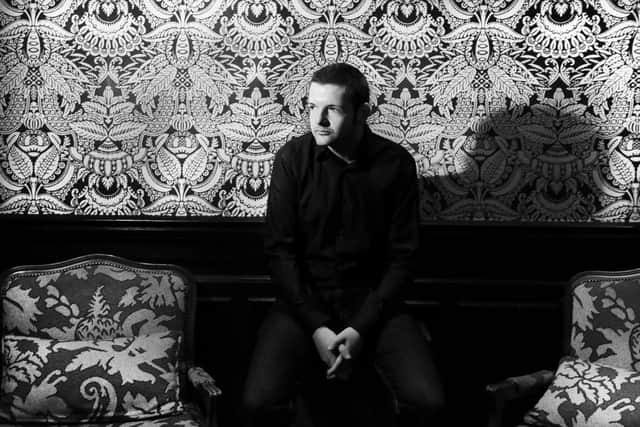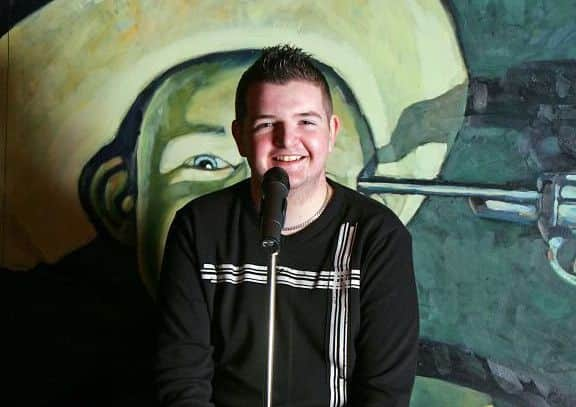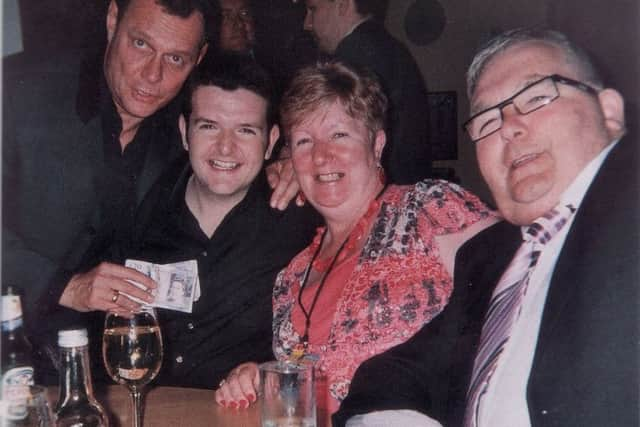Interview: Kevin Bridges speaks out on fame and heckling


KEVIN Bridges gazes out of the windows of a boutique hotel among the elegant villas of Glasgow’s West End, the houses solid against the appropriately genteel-sounding storm Abigail.
“I never knew this existed. Any of this,” he says, indicating the West End, the houses, the hotel with its plush furnishings and deep footstep-muffling carpets. The boy from Clydebank has come a long way in a decade and on the eve of his 29th birthday and with the end of his 180-date stadium tour in sight, he takes a rare moment out to pause for reflection.
So, only another year until he’s 30.
Advertisement
Hide Ad

“Aye. It’s only when people interview you and they mention the last few years – third tour, three DVDs and a book – it feels mental. It seems like it’s been pretty rapid but I started straight from school, so it’s actually been a longer time... but the last few years have been foot on the accelerator. I cannae quite believe I’m 29.”
Kevin Bridges is a household name. He’s reached shout-out-in-the-street status, has a £1 million house just along the road, has paid off his parents’ mortgage and helped his mum retire. His autobiography sells by the shedload and the DVD of his massive live sell-out stadium tour, Kevin Bridges, A Whole Different Story…, which is released tomorrow, will no doubt be a bestseller that pokes out of many a Christmas stocking.
So, we’re in easy street, surely Bridges just has to keep putting one foot in front of another, keep cracking the jokes and watch the good times roll? Well, no, according to the man himself: being rich and famous was never what he was about. Not that he’s complaining.
“I never got intae this with a plan at all. I got in just to literally try stand up. It was the only thing I’d ever been complimented on, being funny. I was never good at sport. Academically, I was all right, but I was too busy trying to have a laugh at school.”


His career in stand up was launched in desperation after he’d sabotaged his education by being the class clown, which in itself was a bid to stay happy and stave off the anxiety that plagued his younger self. To understand Bridges you have to go back to the wee boy who had to be prised away from his mother and pushed sobbing into school every single morning, only to escape at every possible opportunity.
Despite coming from a tight-knit family comprising mum Patricia, care worker, dad Andy, a former social care worker, and older brother John, who from his book all clearly thought wee Kevin was the bee’s knees, the comedian was an anxious child.
Advertisement
Hide Ad“I don’t know why. I just remember always waking up with butterflies every morning, worried that everybody was going to die. And I had all these anxieties, every time I was in school. As soon as the class started I would ask to go to the toilet and run away and have to be brought back.”
By the time he went to high school Bridges knew his life would be hell if he kept up the histrionics, so he held it together and got good grades.
Advertisement
Hide Ad

“But I was bored and then me and my pal Tony became a sort of double act. The grades deteriorated but I was much happier, and never wanted to go back to being as miserable as I had been in primary.”
Bridges writes brilliantly about being a teenager, the lack of focus and lengths they will go to to pursue a laugh – kidnapping Hugh Grant, OK a life-sized cardboard cut-out from the local cinema complex (the police didn’t see the funny side as Hugh accompanied them all in the panda car), or doing a runner from a bowling alley, winding up outside still shod in the ridiculous stripy bowling shoes with their prized trainers locked inside. Bridges was the kind of kid you’d have loved to have had in your class. Unless you were the teacher.
“Yeah, I got chucked out of school, and it all came crumbling down again. Mum and dad were ashamed, embarrassed, I’d been expelled. What was I going to do? I don’t think they saw it coming when I said I’m going to try stand-up comedy.”
Bridges booked himself in for a five-minute open mic slot at The Stand in Glasgow and the rest is comedy history. Does he ever regret messing about at school? What would he say to the young Kevin? Stick in at school and you might not be a successful multimillionaire comedian?
“Aye, it’s a difficult one to call, but…” He ponders, gazing out at the rain. “There are still nights when I’m going to bed going ‘F***ing hell man, what have I done here?’ – in a good way. But that day I got chucked out of school, walking home I was nearly in tears, thinking ‘F***, I’m going to need to tell my mum and dad’.
“But you just need to deal with it and then who would have thought the five-minute slot at The Stand would lead to this? I suppose it’s a lesson in don’t put things off, just go with your instinct.”
Advertisement
Hide AdIt’s one thing being the funny guy at school, but Bridges knew he had to learn the skills to build up to the 80-minute show he has today. Still too young to be served a pint in the venues he was playing and initially escorted by his dad, he toured the clubs, learning on stage and from other comedians.
“You learn the trade on the comedy circuit and you learn about life. I was 17, from Clydebank, I had never met a gay guy, I’d never seen a black guy and you go to London and suddenly you’re in this world with such an eclectic mix of people. It was such an amazing education. I never knew I was working class until I was hanging about with middle class people and they’re calling me that. I was ‘All right, so I’m a bit different?’ They said, ‘Aye, well, you talk about a bunch of bams wrecking the bus stop’. My early stuff was all about what I knew.”
Advertisement
Hide AdThese days Bridges’ subject matter reflects his life in Glasgow’s West End, where dogs are called Diego, as in Rivera not Maradona, and neighbours assume his trackie bottoms, hoodie and trainers mean he’s on his way to the gym as opposed to “going to the garage for a Wispa”. There’s also a more political slant than his earlier shows as age brings a broader perspective.
“I never knew we were working class. I never thought we were poor. It’s just when you look back as an adult, my mum was a home help, my dad was unable to work and was on benefits, we werenae rich but I don’t remember ever struggling for a pair of trainers. My mum worked Christmas Day, Boxing Day, Easter Sunday, weekends. It’s only now you look back a bit more socially aware and that maybe fuels a wee bit of… The joke out there is people ranting about dole scroungers sitting on their fat arses and they don’t have a go at Starbucks or Amazon. You see these companies avoiding their tax, and then they’re going after some guy on £80 a week incapacity benefit. Then people start believing it, the skint turn on the poor rather than the super rich. If somebody cannae work, they cannae work! So you see the hypocrisy in that and if I can humorise that I will.
“There will be some people coming along, going ‘Gies the bus stop joke’, or ‘I preferred you when you were fat’. But I cannae lie to people, I live up here now, I’ve lost a bit of weight, I read a bit more [he’s just finished George Orwell’s Down And Out In Paris And London], I’m a healthier kind of guy. You just change. You cannae keep being the same. I’m not saying I’m going all alternative, man, but I can only do what I find funny.
“This show is probably the one that I’m most proud of. Because of the European dates, you’re trying to write something universal. I’ve been doing it 12 years and got my first big break in 2010 but it’s not that long in terms of stand up. I’m still learning.”
Apart from flexing his comedy muscles, Bridges has also had to learn to deal with other factors that accompany playing 5,000-seater stadia, and “people coming along because you’re somebody famous, they just want to put on Twitter that they’re here, take a picture and look at their phone”.
Then there’s the heckling. “When you play to that many people, it’s a bit more T in the Park. And it’s no’ even heckling, it’s just people shouting your name, where they live, or utter nonsense. It’s just that level of popularity. If one per cent are hammered that’s 30 arseholes in the crowd.”
Advertisement
Hide AdI tell him I was at the show in Edinburgh and saw Bridges getting rattled with someone who kept shouting out.
“Aye, that’s right, I lost the plot with the guy,” he says. “It’s no’ so much at him, it’s just that every night there’s that guy, so if you’re doing 150 shows and you get somebody doing that…”
Advertisement
Hide AdBridges’ frustration stems from his desire to deliver a good show for the punters who have paid to see him and reckons dealing with hecklers crushes the spontaneity that makes for good stand up. “A good gig is when you add bits on, when you get the audience laughing, you’re laughing and you feel as if you’ve riffed a bit with them, it’s spontaneous. There’s nights when it all just happens, like a 147 break in snooker. You’re thinking three or four shots ahead, and if there’s somebody just shouting utter shite you cannae pause and go to the audience and do the extra jokes. People are paying to see me and I’m trying to create something, take the comedy on a wee bit, find other angles to make it funny and develop as a comic.”
It’s not easy being instantly recognisable in your home town, constantly being under scrutiny. When the waitress brings our drinks, she’s remembered my hot water, but not Bridges’ Irn-Bru. After the wood-panelled door has closed he says. “Em, I think I ordered an Irn-Bru, though.” Quickly followed by: “But it’s all right, don’t worry about it.”
I say we should ask for it but he’s adamant.
“Naw, naw, it’s all right. Don’t worry about it. Honestly, it’s cool.”
Is this the price of fame, that you can’t chase up a drink you’ve ordered in case someone thinks you’re a stroppy diva?
“Aye, ‘He was kicking off in front of the waitress, poor wee lassie was mortified’. Ha, ha. Anyway leave it, never mind. I’ll get it later.”
Bridges is punctilious about others’ opinions and feelings, polite and friendly and often apologises for swearing, even when it’s completely in context. He doesn’t feel he’s changed much, while acknowledging that his life and lifestyle certainly has.
Advertisement
Hide Ad“Yeah, your life changes and people change towards you. I cannae walk through the toon any more, I cannae sit on the bus any more, but you cannae disappear up your own arse.”
Can he not go out in disguise?
“Aye, you put a hat on. And Halloween’s a good night for me,” he says.
Advertisement
Hide AdArticles in the media, like his inclusion in a rich list that estimates his haul from the current tour will be £12m make him uncomfortable, not because he reads them, but because others do.
“That’s definitely not true, the £12m, where do they get these figures? I don’t read these things but you notice it when you start getting new pals. People disappoint you a wee bit sometimes, and you don’t know if they were ever really your mate. People that would read articles like that about the money and then they’re, ‘Aw, I’ve not seen you in ages bud, how are you?’”
They’re thinking he’s minted, and should be buying the pints?
“Aye. Fair enough you treat your mates, but then do you become the guy that’s buying friendship? It’s not about money. It’s that you don’t want to be that tragic figure. You see it happen. Paul Gascoigne, in the 1990s he was the man, then he goes through a hard time and where are all his buddies now?”
Bridges’ friends are mainly those he grew up with and when his schedule allows he likes to go for a pint with them because he finds their attitude towards him unchanged.
“Totally, we don’t even mention it… they’ll talk about the gig, nice show last night, but that’s it. I miss going to the football with them, because if I go and see Celtic I sit in the box. You don’t want to be in the stand getting pictures taken with you. It’s not about me, it’s about the game. But I still miss going with my mates, so we’ll go to foreign games, Holland, Barcelona, where naebody knows you. I’m privileged I can take my mates away for football trips, that’s great.”
Advertisement
Hide AdWhat about relationships, is it hard to sustain one when you have to spend countless nights on the road?
“Yes, very. I split up with my girlfriend a year ago.” He hesitates. “I don’t like talking about that in the papers because it’s about somebody else’s feelings. But it’s hard when you’re travelling a lot. And when you’re on tour I’m a difficult guy to be around. You wake up every morning, with the thought of 10,000 people coming to see you. You lie in bed in your boxers and you’re just like, ‘Aw, I hate myself, but I still need to turn on the show the night’. That can be hard to be around 24/7.
Advertisement
Hide Ad“I think because I’ve only done this straight from school, maybe other aspects of my life have been neglected.”
One thing that hasn’t been neglected is his family. Bridges feels a responsibility to pay his parents back and help them financially after they supported him.
“The proudest thing for me was telling my mum that she could quit her job. That was the first thing that I did in 2010 after the first tour, the first SECC. That cheque, I paid off their house and that was it.”
So far so successful, but what’s next for Bridges apart from a good rest over Christmas when the tour ends?
“There comes a point where you’re like, where are you gonna go with this? This year I’ve played to half a million people and you feel a bit mentally exhausted. It takes its toll. I don’t know if I could sustain that forever. I’m grateful for the demand but it’s just crazy, 180 shows. Aye, I think I’ve went a wee bit crazy.” He laughs. “I got a lot of stress this year, I’ve been really quite down about it, it was a bit… this wasn’t what I… I felt as if it was punishment for being a wee arsehole at school.
“When you’re on stage it’s fine, but the year before, you’re having nightmares. I’m no’ saying feel sorry for me, that’s what I signed up for, that’s what drives you to write the show. And I always want to gig and perform and write, so I think I maybe need to scale back to be able to do it.”
Advertisement
Hide AdOffstage Bridges deals with the stress by walking his dog, running and boxing at the gym. “That’s why the weight’s dropped off me. The more stressed I get, the thinner I’ll get,” he says.
I suggest he might like the balance of other comedians like Frankie Boyle, who lives in the same street as Bridges, and is one of his inspirations, being able to balance home life with writing and performing.
Advertisement
Hide Ad“Aye, I want to get into more chilled things. I’ve been offered a couple of things, writing work, and I’ve always enjoyed that. I really enjoyed writing the book. I’d like to do more of that as well as the shows.”
Or he could just retire – technically he probably doesn’t need to work again.
“Aye, but that’s not your motivation. This show has been the most rewarding and seeing it grow, starting from scratch with five minutes of material at The Stand, adding jokes, growing organically to this… I do this because I enjoy it. That’s my motivation.”
Bridges isn’t nearly ready to give it up.
Twitter: @JanetChristie2
• Kevin Bridges, A Whole Different Story… on Blu-ray (£14.99) and DVD (£12.99) is out tomorrow. We Need To Talk About Kevin Bridges, is published by Michael Joseph in paperback at £7.99.